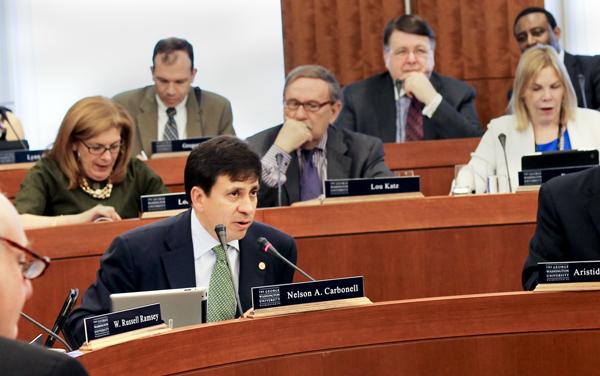Ten years ago, Nelson Carbonell’s software engineering company flamed out — a casualty of business risks and the dot-com bust.
Since then, the 49-year-old’s business career has rebounded, and now he will bring his penchant for risk-taking to his new position as the head of GW’s highest governing body.
Carbonell, who was unanimously approved as Board of Trustees chairman Friday, will take the helm as a slow-moving University tries to develop its own entrepreneurial streak amid collisions of digital offerings and global competition. He begins his tenure July 1, replacing former chairman Russ Ramsey.
Colleagues and administrators say Carbonell, a 1985 School of Engineering and Applied Science alumnus, will help the University capitalize on the $275 million engineering building he envisioned, and steward GW’s dip into digital course offerings.
“People are willing to sign on with Nelson, knowing it’s not going to be a smooth ride, knowing his ambitions for us are so great, and his sense of urgency is so intense,” trustee Diana Henriques said. “We know he’s going to be pushing and shoving and pulling and grinding us along, maybe faster than some of us feel comfortable prodding along.”
The Board, comprised of 36 wealthy alumni, donors and business leaders, has typically served as more of a rubber stamp for administrators’ decisions. But that perception may be changing, particularly as Carbonell takes over.
The group played a central role in shaping the strategic plan it approved Friday, debating the merits of a one-college admissions model at summer strategy sessions and forging a compromise now detailed in the plan.
Boards across higher education are also under pressure because of recent scandals at the University of Virginia and Penn State University, which put trustees in the spotlight.
University President Steven Knapp said Friday he leans on board chairmen when weighing key decisions, and took weekly phone calls with Ramsey. Knapp added that Carbonell has said he wants more face-to-face meetings with the University president.
Carbonell attended the engineering school on a full ride and has since given back, matching the participation rate for the last two years’ senior class gifts — totaling $101,000. He and his wife also started a scholarship fund four years ago, with the first student on the scholarship graduating Sunday.
On the Board, Carbonell said he will encourage a start-up culture, which he added “feels more like a cause than a company.”
“I think I’m good at getting people to do things they wouldn’t normally do, like getting people enlisted in a cause,” said Carbonell, CEO of Reston, Va.-based Snowbird Capital. “It’s a different leadership style. I’m not a top-down leadership person. I want to know what you think.”
During his 11 years on the Board, Carbonell has served as the point man during the University’s most challenging times. Most recently, he led a committee in November that handled the University’s response to the discovery of decade-long admissions data inflation.
He also spearheaded a series of town halls in 2007 to gauge student and faculty needs – input he used to help poach Knapp away from Johns Hopkins University.
Former University President Stephen Joel Trachtenberg, who described Ramsey and Carbonell as a “Batman and Robin” duo, said the pair hand-picked Knapp with a clear vision of a future more reliant on GW’s strength in science and engineering.
“He really has been involved with framing and giving structure to those aspirations that developed during the last presidential search,” Knapp said.
Some, though, have resisted the direction in which Carbonell and top administrators have been steering the University.
Economics professor Donald Parsons noted Carbonell forced the idea of building a $275 million “engineering palace” on professors.
“He’s the one that came in to push it,” Parsons said, calling him a “very aggressive leader.”
Henriques, a trustee and New York Times staff reporter, said Carbonell is also looking to map out GW’s digital push, mirroring his mid-1990s advising of newspaper publishers to adapt their businesses for the web.
She said he’s been brainstorming ways to help GW bring higher education online, especially as universities scramble to adopt massive open online courses.
“I don’t know he’s right, but I know he’s thinking about it, and we need to be thinking about it. And under his leadership, we will be thinking about it,” Henriques said.
Still, Carbonell said he will strategically choose the transformations he leads during his tenure.
“I learned you have to be really patient with GW. Things don’t change like business. They don’t turn on a dime. The place has been here for almost 200 years. You have to respect that right,” he said.







